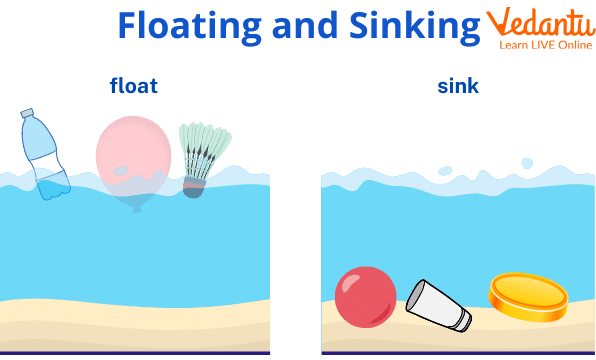




What Makes Objects Float or Sink? Explained for Students
Have you ever wondered about why some objects sink, and some objects float?
You might think that the bigger things sink and smaller things float, but this is not true!
There are so many more reasons behind the mystery of the process of sinking and floating. Why do some objects float while others sink?
Well, it’s all about something known as density. Do you know what float or sink density means? Well, everything around us is made up of some tiny molecules. In some objects, these molecules are jam-packed with each other, and in others, they are loosely packed together.
Floating and Sinking Definition
If Something is More Dense than Water, will it Float?
If an object is denser than water, it will sink when placed in water, and if it is less dense than water, it will float.
The density is defined as a measure of how heavy something is compared to its size. If an object is denser than that water, it will sink when placed in water, and if it is less dense than that of water, it will float. The density is a characteristic property of a substance and doesn't depend on the amount of substance.

Different Objects Floating and Sinking.
What will Sink and What will Float?
We will learn this by doing one experiment.
Get a bowl or a bucket. And fill the water into it and collect a few objects around the house or from your garden. For example the objects like a piece of small wood, a stone, a sponge, an egg, a spoon, small balls or anything else that you can find around you.
Put these objects in the bucket or bowl full of water and observe what will sink and what will float. Now you’ll see that whatever objects sink are denser, and what floats are less dense.
Write all your findings down.

Experiment for Checking the Floating or Sinking Objects.
Summary
Well, everything present around us is made up of tiny molecules.
Let’s think for a minute about other bigger objects like a boat, or maybe even an airship. Why do things sink or float?
Some boats are very big and seem very dense, so how do they stay afloat? Well, the boat has to push the water aside, so there’s room for it. As it is so heavy, the heavy boats get pulled down by the force of gravity.
Now think about what will happen when you put an ice cube into a glass of water.
As the ice cube moves some of the water to make way for itself, the water level rises, and the ice floats half in and out of the water.
The gravity pulls the ice cube down, and the force pushes it up. It totally depends on the gravity of how far the ice cube will stay in or out of the water. It works according to the pushing and pulling forces that are working against it.
FAQs on Floating and Sinking: Easy Examples and Science
1. What do 'floating' and 'sinking' mean in simple terms?
In simple terms, floating is when an object stays on the surface of a liquid, like water, without going under. For example, a leaf floats on a pond. Sinking is when an object drops below the surface of the liquid and falls towards the bottom. For example, a stone sinks in water.
2. What is the main principle that decides if an object will float or sink?
The main principle is density. An object's density is about how heavy it is for its size. If an object is less dense than water (light for its size), it will float. If it is denser than water (heavy for its size), it will sink. This is why a light wooden block floats, but a small, heavy pebble sinks.
3. Why does a huge iron ship float, but a tiny iron nail sinks?
This is a great example of how shape matters! A tiny iron nail is a solid piece of metal, which is much denser than water, so it sinks. A huge ship, although made of iron, is not a solid block. It is mostly a hollow shell filled with air. This hollow shape makes the ship's average density less than water. Its special shape also displaces, or pushes aside, a large amount of water, which creates an upward push (buoyancy) strong enough to hold the ship up.
4. What is the difference between floating and sinking?
The key difference lies in the balance of forces. An object floats when the upward buoyant force from the water is equal to or greater than the object's weight (the downward pull of gravity). An object sinks when its weight is greater than the upward buoyant force, causing it to fall through the water.
5. Why does oil always float on top of water?
Oil floats on water because it is less dense than water. Even if you try to mix them, the oil will always separate and rise to the top, forming a layer. This is why you might see rainbow-coloured oily patches on top of puddles after it rains.
6. What are some everyday examples of things that float and sink?
Here are some common examples from our daily lives:
- Things that Float: A plastic bottle (empty), a wooden stick, a dry leaf, a sponge, a piece of thermocol, and a rubber duck.
- Things that Sink: A coin, a metal key, a marble, a stone, scissors, and a spoon.
7. Why does a dead fish first sink and then float later?
When a fish dies, its body is denser than water, so it sinks to the bottom. However, as bacteria inside the fish's body start to decompose it, they produce gases. These gases get trapped inside the fish's body, making it swell up like a small balloon. This trapped gas makes the fish less dense overall, causing it to become buoyant and float back to the surface.









